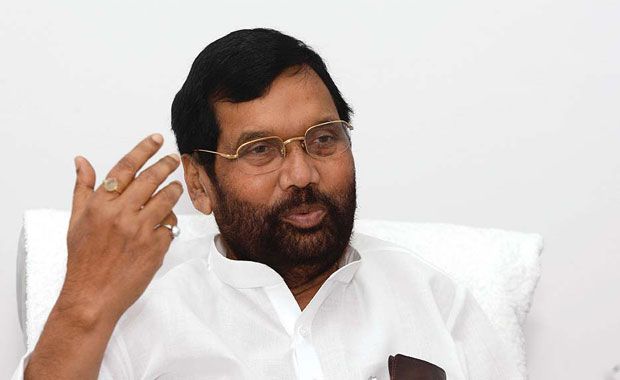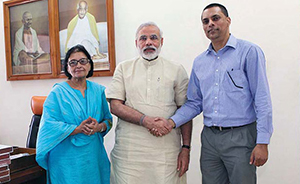“We are becoming pro-consumer”
A heavyweight with a formidable track record at the top levels of Indian politics, Mr Ram Vilas Paswan has been tasked with a challenging portfolio—Consumer Affairs, Food and Public Distribution. His job is to ensure that the tormented customer’s trust in the free-market economy in restored. It is a market where with the daily advent of new brands and slick marketing, consumer complaints are constantly on the rise. Mr Paswan needs to ensure that Mahatma Gandhi’s noble words on the importance of the customer are practiced each day this country. In previous Governments, Mr Paswan held key federal ministerial positions in Labour and Welfare, Railways, Communication and Information Technology, Coal and Mines, Chemicals and Fertilizers, and Steel. A Member of Parliament for 38 years, Mr Paswan has been elected to the Lok Sabha eight times, and nominated to the Rajya Sabha once. In the 2014 elections, he entered the Lok Sabha for the eighth time from Hajipur, a largely Dalit constituency he
“A customer is the most important visitor to our premises. He is not dependent on us. We are dependent on him. He is not an interruption of our work. He is the purpose of it. He is not an outsider to our business. He is part of it. We are not doing him a favour by serving him. He is doing us a favour by giving us the opportunity to do so.”
—Mahatma Gandhi in a speech in South Africa in the late 19th century
Interview with Mr Ram Vilas Paswan, Minister for Consumer Affairs, Food and Public Distribution, Government of India
You have said in the past that the NDA Government is committed to upholding and protecting the welfare of consumers, particularly rural consumers, women and children. What measures have you taken in this direction?
The Consumer Protection Act came about in 1986. In the last 29 years, things have changed completely. E-commerce has come into play in a major way, and consumer awareness has increased. But the old law is still in place. Keeping in tune with the times, we introduced a new bill in Parliament, known as the Consumer Protection Bill, 2015. It has been passed by both Houses, and will soon become an Act. This will help address a range of issues related to the segment you mentioned, and assuage several grievances.
Are you satisfied with the cooperation of various stakeholders such as State Governments, NCDRC, State Consumer Forums, District Forums, BIS and Voluntary Consumer Organizations?
We are very thankful to all activists with whom we have held meetings for discussing consumer rights and consumer protection. They are all knowledgeable. We have had three meetings with the Consumer Affairs Ministers of state Governments in the past one year to discuss problems being faced by the consumers. We are continuously holding meetings with the secretaries which are creating a lot of awareness. We have also written letters to the Chief Ministers, after all in states, consumer courts exist at two levels—district and state. We seek their cooperation in this movement. Usually at respective district, state and central levels the consumer forum is headed by a retired judge of a district court, a High Court, and Supreme Court. Members are appointed to each forum. As of now, unfortunately, consumer courts in our country are not functioning effectively. The reason is very basic—a lack of infrastructure and remaining headless. Five state forums including those in Kerala, Nagaland, Rajasthan and Telangana do not have presidents, and 17 of them do not have members. At the district level, 102 forums do not have presidents, and 266 of them are without members. Members at many places at district and state levels do not have a place to even sit. In some states they are paid a nominal salary, in some they do not even receive that. Our priority is to improve infrastructure and fill up vacancies at the district level forums, because that is where 90 per cent of the cases are filed. We have also now mandated that if a case is not admitted within 21 days, it will automatically be considered an FIR so that the consumer does not suffer. Also, there is another major change we have brought about—while earlier a consumer needed a lawyer to file a case in a consumer court, now we have announced that the consumer does not necessarily need a lawyer and can file on his own.
Is there a way that things can be settled out of court?
We have made a few other changes. In case a State Court gives a judgment in favour of the consumer, it cannot be appealed at the National Forum. We have introduced a system of mediation, and it can be opted at any level. We are trying to make all these courts pro-consumer. We have issued guidelines that courts need to give judgments within 90 days of a complaint being filed.
We understand that you have formed the Consumer Protection Authority?
Yes. We have also authorized courts to handle not just individual complaints but complaints pertaining to a batch of products. The courts earlier did not have such authority. For instance, if a bottle of water is poor in quality, chances are that the entire batch has poor quality water. Now the entire batch can be looked into. The CPA will have various departments to cater to the consumers. It will have wide ranging powers. For example if a builder promises you a ready-to-move-in house in 3 years, but fails to do so, the CPA will have powers to investigate. Investigation results will be submitted to the National Forum, but the CPA will be empowered to take action against the offender. Cases of unfair trade practice and false advertising will be addressed as well.
Improper services by hospitals, airlines and other organizations will also be investigated by the CPA.
How do you enhance awareness among consumers about their rights and responsibilities?
Currently, we have a campaign “Jago Grahak Jago’ running but I feel there is great need for more aggressive campaigning at every level. For example, the gold and silver is brought by even the poor and people are unaware of the quality of gold in terms of carats. In some cases the consumer is given gold of 9 carats but is charged for 10 carat gold. Although there is hallmarking, it is not mandatory. We have made modification in the BIS also; we have placed it in Parliament as well. The Bureau of Indian Standards Act 1986 has been completely changed. Prime Minister has introduced ‘Make in India’, how will it work if there are no proper standards, which is why the changes in BIS were necessary.











Comments.